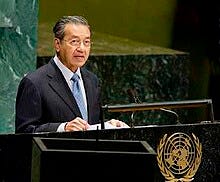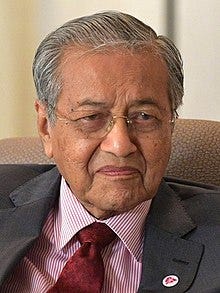The Diplomatic Art of Not Knowing
Unsolicited Advice on Asking Good Questions (Plus a Real Life Example from a Rare Official Meeting in 2003 with then-Malaysian Prime Minister Mahathir Mahamad)
A cliché in diplomacy is that we have two ears and one mouth for good reason. If we aren’t listening at least twice as much as we’re speaking, we’re getting it wrong. Diplomats are professional listeners in that sense, or ought to be.

One common mistake made in this connection is the unnecessary assertion of knowledge. We believe we need to know about issue X and to let it be known that we know. Or, god forbid, pretend we know more than we do. Or show off the little we do know, like a peacock spreading its wings. Unlike the peacock, such preening ain’t pretty.
Maybe it’s a matter of growing older, but I now have little trouble admitting I don’t know, which happens often. I can acknowledge the fact without embarrassment and then ask for clarification. One of my favorite bosses in the foreign service told me early on that, to be a good diplomat, you needed to learn—if it didn’t come naturally, alas—how to play dumb: “Can you explain what you just said again? I’ve never heard that acronym before. I’m afraid I didn’t quite get the reference?” Not knowing gives you room to find out.
It took me at least ten years in the business to discover the connection between arrogance and laziness. If you’re arrogant, you believe you know—or know better than others. And if you already know, then your work—as far as you’re concerned—is done. You’re good to go. You can sit on your rear, rest on your laurels, gaze down with disdain on those lesser mortals still scurrying about trying to find out what you already know. Hell, since you know better than they do, you can even lord it over them a little—or a lot. Wrong. Wrong. Wrong.
A painful memory resurfaces. I once asked a certain subordinate to travel to a certain part of a certain country following a certain seismic event that had killed scores of people and destroyed major infrastructure. We wanted to better appreciate the state of play on the ground and find out firsthand about the local authorities’ plans for recovery. The answer took me aback:
“I already know what they’re going to tell me.”
“Really?! What questions had you planned to ask? How had you planned to ask them?”
There is never any justification for laziness or arrogance. Full stop.
*****
The Frontier Between Knowing and Not Knowing
Of course, it’s not enough simply not to know. Leaving aside the Rumsfeldian question of unknown unknowns, you have to know what you know, and know what you don’t. You have to know the point at which your knowledge ends and where your ignorance begins. In that sense, you have to know a great deal in order not to know in the right way, professionally speaking. Having this frontier of knowledge clear in your mind sheds light on what else—or what more—you may need to know after that. This good kind of not knowing presupposes lots of advanced knowledge, prior legwork, and active listening.
I sometimes find myself reminding young professionals (mostly if they ask, sometimes when they don’t) that they should always be prepared to ask questions—but that not just any question will do. The kind of question whose answer they might easily find on their own, for example, is often better left unasked. It might suggest an attempt to transfer work they themselves should have done in advance, and to pass that responsibility across to their (quietly annoyed) interlocutor. This is unlikely to make a good first impression, and may cause doors to close without their knowing why.
The Art of the Good Question
Enter the art of the good question. Good questions are part of any productive exchange or enjoyable conversation, and a core component of sound diplomacy. On the simple human level, good questions demonstrate respect, help build connection, reinforce bonds of trust and even affection—particularly when they’re motivated by genuine interest and real curiosity. My mother used to say that the shortest path into another person’s good graces is to ask them sincere, thoughtful questions—about their life, their experience, what they think and know. This seems so easy and obvious as to be scarcely worth mentioning, which is why it’s such a surprise not to see it done more often.
Good questions come in different shapes and sizes, of course. They include elements of form and content, tone and framing, and also timing. But whatever form they take, they’re easy to identify: good questions are the kind that elicit useful answers. You may be seeking new information or a different perspective. You may be trying to confirm a rumor or a report heard elsewhere. You may be throwing out a line to see what you get. It depends on the situation.
Typically, good questions go to the edge of what you already know and probe into what lies just beyond. In that sense, they combine a (quick) summary of the advance work you’ve done, with due respect for the special insight of the person with whom you’re conversing. You’ve paid the entrance fee, proved you belong, and are prepared to do your part.
*****
An Example of an Excellent Question
I’ll close with a concrete example of a memorably good question I heard asked—and answered—over two decades ago in Kuala Lumpur.
A Congressional delegation led by the late Amo Houghton (R-NY) visited Malaysia in mid-2003. For the record, Congressman Houghton embodied that seemingly bygone breed of decent, deeply pragmatic, moderate, middle-of-the-road Republican. His own father had been ambassador to France in the late 1950s, which gave him a personal appreciation and professional respect for the work of diplomacy. Houghton was accompanied by Congressman Darrell Issa (R-CA), a savvy businessmen turned politician with a personal interest, as a Lebanese American, in foreign affairs. Notwithstanding his sometimes testy relationship with the State Department in ensuing years, Issa’s simple question, and the way he asked it, still echoes in my mind as one he couldn’t have framed any better even after years of diplomatic training.
That his question elicited such a useful response was the proof in the pudding.
For context: When Codel Houghton came to Kuala Lumpur, then Malaysian Prime Minister Mahathir Mahamad had been in power 22 years amid rumors he was (finally) prepared to step down. Similar rumors had swirled in the past, so we were unsure what to make of their latest manifestation. Were they trial balloons, false alarms, reflections of the resurgent wishful thinking of political rivals? Mahathir was famously ornery, suspicious, and wary of potential competitors. Like many autocratic-type leaders, he kept his own counsel and didn’t take kindly to criticism. He tended to decline requests for meetings with visiting US officials for this reason. Word had it he didn’t appreciate being hectored about Malaysia’s human rights record or taken to task for his high profile jailing on trumped up charges of his previous deputy—and principal political rival— Anwar Ibrahim1.
For Codel Houghton, however, Mahathir made an exception. The Iraq war was then underway, and he may have hoped to share a few critical observations of his own—as the respected voice of a moderate Muslim-majority nation—to the visiting emissaries from Washington. Per established practice, Embassy leadership kicked off the visit with a “country team briefing”. These internal briefings are meant to provide visiting officials with an overview of the lay of the land, a perspective of how US strategic priorities are playing out on the ground, and—depending on when and where—a cautionary note about minefields to tread around carefully or avoid altotether. (The Prime Minister’s testiness would surely have been one). For the Embassy’s purposes, the rare meeting with Mahathir provided a welcome opportunity to hear from the great man himself about—among other things, of course—his future career plans.
The meeting itself went off without a hitch, but I remember that just as things were winding down, Congressman Issa posed a simple question: “So Mr. Prime Minister, I understand you’re considering retiring?” Issa’s timing was exquisite, as though it were an afterthought—more nicety than business. His hesitant tone, too, was pitch-perfect, as though the rumors may have been false and he was prepared for the Prime Minister to correct the record. The framing was similarly apt: he had inserted the word “considering”—suggesting a process not yet concluded, continuing uncertainty, a going concern. This gave the Prime Minister ample room to contradict, deny, or push back. Instead, Mahathir responded matter-of-factly. I remember his response verbatim: “Not considering, decided.”
Hearing the firm, clear, and unhesitating response, we knew right away it was true. And we were able to tell interested parties in Washington that a new Malaysian leader was in the offing.
I remember thinking Congressman Issa couldn’t have found a better way to pose that question, and telling him so. Had he phrased it more directly or forcefully, for example, Mahathir might have felt emotionally cornered and grown defensive. Had he spoken in a confident tone, as though he knew it was true or figured it was, the Prime Minister’s back might have stiffened. Had he removed the word “considering” and gone with the straightforward “I hear you’re retiring,” it might have come across as a kind of suggestion, a subtle command, or even a slight push out the door. This might have produced a more fudging, ambiguous, even obfuscating answer; that is, a less useful one. I suppose we’ll never know.
Postcript
It turns out that Mahathir had clearly had second thoughts all along. Because while he did indeed step down several months later, he never really went away. To the surprise of many, he returned—this time as a nonagenarian—to assume the Prime Minister role again from 2018-2020. It seems that power, for those who have enjoyed its fruits in the past, is hard to give up—or to cede to the next generation.
Lucky we don’t have the same problem here in the United States.
Anwar is currently Malaysia’s Prime Minister.





Interesting article. Thank you.
I did have a question. In the third paragraph, you talk about the importance of sometimes playing dumb "I don't recognize that acronym," for example. Then in the second paragraph of "The frontier between Knowing and Not Knowing," you suggest that the kind of questions whose answer they might easily find on their own is better left unasked. I'm having a hard time reconciling these two. Or is that where the art lies?
I came here expecting titillating erotica. What the HECK? 🤔